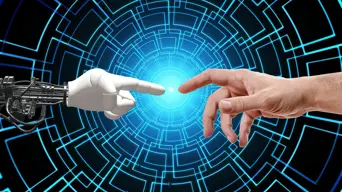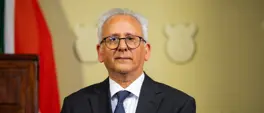JAMIL F. KHAN | Losing grace: The human cost of AI efficiency
Jamil F. Khan
7 August 2025 | 15:19"I am concerned for what AI will do to our already poor cultures of accountability, while also eradicating whatever measures of grace we have agreed to in our working relationships with each other."

Picture: Pixabay/geralt
The proliferation of AI technology is proceeding at incredible speed, or at least it feels that way to those of us who have not acquiesced to its seductive wiles. Its uptake has been encouraged by the fundamental promise of ease.
As a tool, AI offers to think for you, to try for you, to labour for you, to any extent you would choose.
Though the ethics of its offering are widely debated, and people have used AI for dishonest ends, it is an assistant to many.
The evolution of technology for the purposes of improving human life is a trend that has persisted since the beginning of social formation. AI displays this potential, to make life easier, but it comes in a time of reckless capitalist expansion coupled with an aversion to truth.
Though it poses many threats, including to jobs, the value of creativity and intellectual property, my concern currently lies beyond these parameters.
I am concerned for what AI will do to our already poor cultures of accountability, while also eradicating whatever measures of grace we have agreed to in our working relationships with each other.
Institutions, however slowly, are creating policies to deal with the implications of using AI as an everyday tool to perform professional functions, but what happens when the standards of efficiency and quality are no longer determined by human beings? Are policies being created with this impact on human relations in mind?
My concern stems from the idea that the professional standards set for people’s outputs can soon be determined by the capabilities of machines, which can be programmed to eradicate human error – not withstanding that its design will still be prone to that same error.
If a machine can do it in minutes with no need for meticulous checking, could human error in the delivery of work become unacceptable? While the rollout of AI is still subject to the accessibility of the basic resources that make it possible, such as internet connection, the supposed benefits it brings remain constrained by the very same inequalities developers are happy to overlook.
When referring to cultures of accountability, I am aware that this is hardly a reality, however, when it comes to organisational structures there are processes that pursue accountability from people when things go wrong. The punitive element of this culture, which is not actually what accountability is about, is a site of much workplace abuse and intolerance, and for that reason most people would rather avoid accountability than adjust their behaviour.
When offered a machine to which all responsibility can be deferred, an avoidance of responsibility seems like a great deal. The danger in this avoidance of responsibility is not only about one’s responsibility to deliver good work, if that is of interest, but also the responsibility to our co-workers. We bear responsibility to each other because we understand that we need each other in order to perform our functions.
This is what it means to live in a society, despite the aggressive ‘individualist’ messaging we receive under capitalism. Our co-workers can be a blessing or a nightmare, depending on the relationship we have with them.
Individualism is of course not confined to the workplace, as it is reflected in society as well. Our potential overreliance on machines to do human work, though something that has happened throughout history, puts us in a position to risk forgetting what makes us human. Amongst many other things, it is our propensity for error. Within our humanness, in this relationship with error, we sustain our relationships through grace.
We have come to expect mistakes of human beings, not as something that should be eradicated, but reminders of our fallibility. Having to sit in our mistakes and the impact they have on others, has offered us pathways into growth and the ability to practice connection and community. We give each other multiple chances to “get it right” because the fact of our humanity cannot be denied as it rests on ability, as much as inability.
What we learn about others and ourselves through the experiences of error and the disappointment it brings is invaluable in the creation of cultures that are accommodating of our differences. When seen for what it is, human error signals the shifting limits of human ability, which is entitled to grace. When we are intentional about it, we create cultures that recognise grace as a necessity in conducting human relationships.
As AI advances, and its many uses are presented in more sophisticated ways, we risk losing sight of the responsibilities that come with being human. When humans behave badly or make mistakes, accountability has been an appeal to people’s humanity that says “you have a responsibility to your fellow humans to correct yourself if you want to enjoy a place in the collective of society”.
When given the option to shield oneself from that responsibility, what might seem like a liberation is actually a death of the most social parts that define us.
Though I do not reject AI completely, I am concerned for what it will do to our social cultures that already hang together by a very precarious thread. After centuries of ongoing systemic oppressions that have destroyed social relations and estranged people from their humanity, we can ill-afford a shift to cultures of even less grace and accountability.
We think that our survival depends on constant technological solutions to daily problems. While this is useful, we must let our humanity shape our technology, and not the other way around. Technology should be a reflection of our collective investment in improving our methods of co-existence, not a way out of doing the work to improve those methods of co-existence.
At the heart of human existence is sociality. This sociality has been threatened many times before, and when the most oppressive conditions have descended upon people, they survived through relying on other people.
Through the long history of struggle for the right to be human, this fact has remained. Remembering this demands different choices from us, and while we marvel at the pace of innovation and think through ways to capitalise on it, we must remember that it will one day, again, come back to needing another human.
Jamil F. Khan is an award-winning author, doctoral critical diversity scholar, and research fellow at the Johannesburg Institute for Advanced Study.
Get the whole picture 💡
Take a look at the topic timeline for all related articles.
Trending News
More in Opinion

4 March 2026 08:33
CHARLES MATSEKE | War in the Middle East and South Africa’s maritime moment

3 March 2026 11:40
Who belongs in South Africa? UCT philosopher weighs in on identity and ownership

2 March 2026 11:05
TLALI TLALI |Mandate, money and accountability - What the government website debate really reveals













